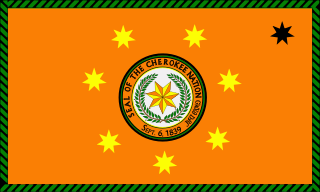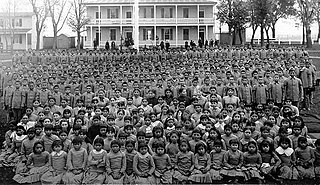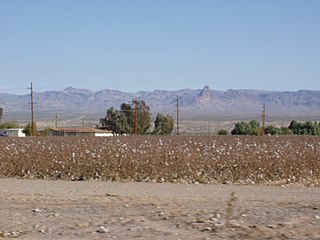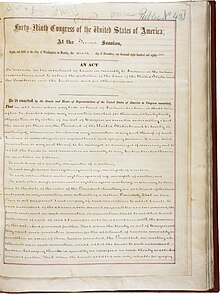Effects
United States v. Nice was referenced in the case United States v. Mazurie to support the court's decision to uphold a conviction of selling alcohol in Indian Country against non-Indians on the Wind River Reservation who had been denied a tribal liquor license. [9] United States v. Nice upheld Congressional power to regulate any commercial transaction involving individual Indians or a tribe, [10] wherever situated, and to regulate the introduction of alcoholic beverages into Indian country. [9]
In his book American Indian Sovereignty and the U.S. Supreme Court: The Masking of Justice, David E. Wilkins claims that the decision in United States v. Nice "Muffled rights of individual Indians as federal citizens." The court's decision continued the contradictory treatment of Native Americans with the incongruous ideas of Indians as dependent people in need of protection and Indians as United States Citizens. [11]
United States v. Nice upheld the plenary power of Congress. The nearly unlimited power of Congress to adjust Indian rights still exists today. However, in the late 1960s and 1970s, congressional leadership began to see Indian policy in a new light. The past half century has seen a surge of laws favorable to Indians which allow tribes much more influence over their own futures. [12] In fact, some Native Tribes, including the Yakama Nation, have banned alcohol on their reservations through acts of tribal sovereignty. [13]

The Dawes Act of 1887 regulated land rights on tribal territories within the United States. Named after Senator Henry L. Dawes of Massachusetts, it authorized the President of the United States to subdivide Native American tribal communal landholdings into allotments for Native American heads of families and individuals. This would convert traditional systems of land tenure into a government-imposed system of private property by forcing Native Americans to "assume a capitalist and proprietary relationship with property" that did not previously exist in their cultures. The act allowed tribes the option to sell the lands that remained after allotment to the federal government. Before private property could be dispensed, the government had to determine "which Indians were eligible" for allotments, which propelled an "official search for a federal definition of Indian-ness."

Tribal sovereignty in the United States is the concept of the inherent authority of indigenous tribes to govern themselves within the borders of the United States.
Oliphant v. Suquamish Indian Tribe, 435 U.S. 191 (1978), is a United States Supreme Court case deciding that Indian tribal courts have no criminal jurisdiction over non-Indians. The case was decided on March 6, 1978 with a 6–2 majority. The court opinion was written by William Rehnquist, and a dissenting opinion was written by Thurgood Marshall, who was joined by Chief Justice Warren Burger. Justice William J. Brennan did not participate in the decision.

The Cherokee Nation, also known as the Cherokee Nation of Oklahoma, is the largest of three Cherokee federally recognized tribes in the United States. It includes people descended from members of the Old Cherokee Nation who relocated, due to increasing pressure, from the Southeast to Indian Territory and Cherokee who were forced to relocate on the Trail of Tears. The tribe also includes descendants of Cherokee Freedmen, Absentee Shawnee, and Natchez Nation. As of 2023, over 450,000 people were enrolled in the Cherokee Nation.

The Indian Citizenship Act of 1924, was an Act of the United States Congress that granted US citizenship to the indigenous peoples of the United States. While the Fourteenth Amendment to the United States Constitution defines a citizen as any persons born in the United States and subject to its laws and jurisdiction, the amendment had previously been interpreted by the courts not to apply to Native peoples.

A series of efforts were made by the United States to assimilate Native Americans into mainstream European–American culture between the years of 1790 and 1920. George Washington and Henry Knox were first to propose, in the American context, the cultural assimilation of Native Americans. They formulated a policy to encourage the so-called "civilizing process". With increased waves of immigration from Europe, there was growing public support for education to encourage a standard set of cultural values and practices to be held in common by the majority of citizens. Education was viewed as the primary method in the acculturation process for minorities.
Duro v. Reina, 495 U.S. 676 (1990), was a United States Supreme Court case in which the Court concluded that Indian tribes could not prosecute Indians who were members of other tribes for crimes committed by those nonmember Indians on their reservations. The decision was not well received by the tribes, because it defanged their criminal codes by depriving them of the power to enforce them against anyone except their own members. In response, Congress amended a section of the Indian Civil Rights Act, 25 U.S.C. § 1301, to include the power to "exercise criminal jurisdiction over all Indians" as one of the powers of self-government.
The Citizenship Clause is the first sentence of the Fourteenth Amendment to the United States Constitution, which was adopted on July 9, 1868, which states:
All persons born or naturalized in the United States, and subject to the jurisdiction thereof, are citizens of the United States and of the State wherein they reside.
Elk v. Wilkins, 112 U.S. 94 (1884), was a United States Supreme Court landmark 1884 decision respecting the citizenship status of Indians.
United States v. Kagama, 118 U.S. 375 (1886), was a United States Supreme Court case that upheld the constitutionality of the Major Crimes Act of 1885. This Congressional act gave the federal courts jurisdiction in certain Indian-on-Indian crimes, even if they were committed on an Indian reservation. Kagama, a Yurok Native American (Indian) accused of murder, was selected as a test case by the Department of Justice to test the constitutionality of the Act.

Talton v. Mayes, 163 U.S. 376 (1896), was a United States Supreme Court case, in which the court decided that the individual rights protections, which limit federal, and later, state governments, do not apply to tribal government. It reaffirmed earlier decisions, such as the 1831 Cherokee Nation v. Georgia case, that gave Indian tribes the status of "domestic dependent nations," the sovereignty of which is independent of the federal government.
The Cherokee Freedmen controversy was a political and tribal dispute between the Cherokee Nation of Oklahoma and descendants of the Cherokee Freedmen regarding the issue of tribal membership. The controversy had resulted in several legal proceedings between the two parties from the late 20th century to August 2017.

The Muscogee Nation, or Muscogee (Creek) Nation, is a federally recognized Native American tribe based in the U.S. state of Oklahoma. The nation descends from the historic Muscogee Confederacy, a large group of indigenous peoples of the Southeastern Woodlands. Official languages include Muscogee, Yuchi, Natchez, Alabama, and Koasati, with Muscogee retaining the largest number of speakers. They commonly refer to themselves as Este Mvskokvlke. Historically, they were often referred to by European Americans as one of the Five Civilized Tribes of the American Southeast.
Lone Wolf v. Hitchcock, 187 U.S. 553 (1903), was a United States Supreme Court case brought against the US government by the Kiowa chief Lone Wolf, who charged that Native American tribes under the Medicine Lodge Treaty had been defrauded of land by Congressional actions in violation of the treaty.

Indian country jurisdiction, or the extent which tribal powers apply to legal situations in the United States, has undergone many drastic shifts since the beginning of European settlement in America. Over time, federal statutes and Supreme Court rulings have designated more or less power to tribal governments, depending on federal policy toward Indians. Numerous Supreme Court decisions have created important precedents in Indian country jurisdiction, such as Worcester v. Georgia, Oliphant v. Suquamish Tribe, Montana v. United States, and McGirt v. Oklahoma.
United States v. Lara, 541 U.S. 193 (2004), was a United States Supreme Court landmark case which held that both the United States and a Native American (Indian) tribe could prosecute an Indian for the same acts that constituted crimes in both jurisdictions. The Court held that the United States and the tribe were separate sovereigns; therefore, separate tribal and federal prosecutions did not violate the Double Jeopardy Clause.
Santa Clara Pueblo v. Martinez, 436 U.S. 49 (1978), was a landmark case in the area of federal Indian law involving issues of great importance to the meaning of tribal sovereignty in the contemporary United States. The Supreme Court sustained a law passed by the governing body of the Santa Clara Pueblo that explicitly discriminated on the basis of sex. In so doing, the Court advanced a theory of tribal sovereignty that weighed the interests of tribes sufficient to justify a law that, had it been passed by a state legislature or Congress, would have almost certainly been struck down as a violation of equal protection.
Ex parte Crow Dog, 109 U.S. 556 (1883), is a landmark decision of the Supreme Court of the United States that followed the death of one member of a Native American tribe at the hands of another on reservation land. Crow Dog was a member of the Brulé band of the Lakota Sioux. On August 5, 1881 he shot and killed Spotted Tail, a Lakota chief; there are different accounts of the background to the killing. The tribal council dealt with the incident according to Sioux tradition, and Crow Dog paid restitution to the dead man's family. However, the U.S. authorities then prosecuted Crow Dog for murder in a federal court. He was found guilty and sentenced to hang.

An Organic Act is a generic name for a statute used by the United States Congress to describe a territory, in anticipation of being admitted to the Union as a state. Because of Oklahoma's unique history an explanation of the Oklahoma Organic Act needs a historic perspective. In general, the Oklahoma Organic Act may be viewed as one of a series of legislative acts, from the time of Reconstruction, enacted by Congress in preparation for the creation of a united State of Oklahoma. The Organic Act created Oklahoma Territory, and Indian Territory that were Organized incorporated territories of the United States out of the old "unorganized" Indian Territory. The Oklahoma Organic Act was one of several acts whose intent was the assimilation of the tribes in Oklahoma and Indian Territories through the elimination of tribes' communal ownership of property.
Sharp v. Murphy, 591 U.S. ___ (2020), was a Supreme Court of the United States case of whether Congress disestablished the Muscogee (Creek) Nation reservation. After holding the case from the 2018 term, the case was decided on July 9, 2020, in a per curiam decision following McGirt v. Oklahoma that, for the purposes of the Major Crimes Act, the reservations were never disestablished and remain Native American country.








